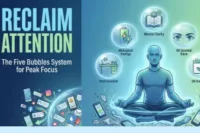Future of Remote Freelancing: Key Trends and Insights for 2025 Success
Published: 25/05/2025
By 2025, over 50% of the global workforce is expected to be freelancing, marking a monumental shift in how work gets done. Since 2020, remote freelancing has surged, driven by technological advancements and changing work culture, reshaping industries across the globe.
As we approach 2025, the freelancing landscape will look vastly different, and to succeed in this evolving market, freelancers will need to adopt new strategies, upskill constantly, and embrace fresh mindsets.
In this post, we’ll explore the top trends and insights shaping the future of remote freelancing, offering actionable advice to help you stay ahead of the curve. Whether you’re a seasoned freelancer or considering making the leap, these insights will equip you with the tools you need to thrive in the growing gig economy.
The Future of Remote Freelancing: What Will Change by 2025?
The remote freelancing landscape is evolving rapidly. In 2025, the dynamics of freelancing will be significantly different from what they are today. Below are the key factors shaping this change:
From Growth to Dominance: Remote Freelancing’s Rise and What’s Next
Today, remote freelancing is growing, but in 2025, more than 50% of the global workforce is expected to participate in freelance work. The rise of gig economy platforms and advancements in remote collaboration tools will contribute to this shift.
Key Market Forces Driving the Evolution of Freelancing
Key market forces, including the post-pandemic shift, economic changes, and technological advancements, are driving the evolution of freelancing, creating both challenges and opportunities.
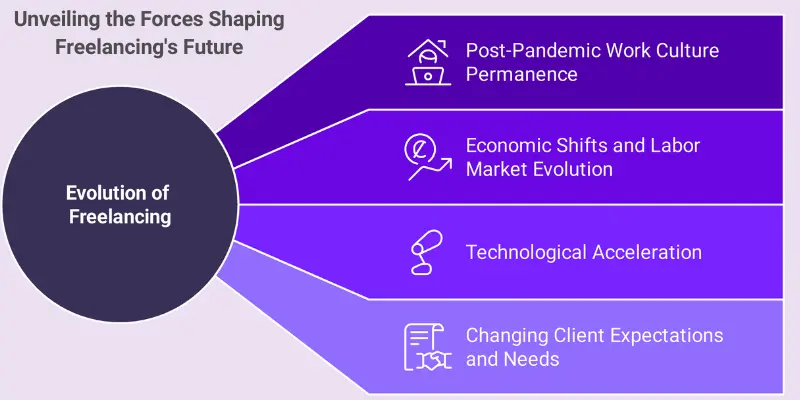
- Post-pandemic work culture permanence: The pandemic solidified the acceptance of remote work. Many companies have adopted hybrid models, and remote freelancing will continue to thrive as businesses recognize the value of flexibility.
- Economic shifts and labor market evolution: As traditional jobs evolve, freelancers will face more competition, but also increased opportunities as companies look to reduce overhead costs and access a global talent pool.
- Technological acceleration: New tools and automation will change the way freelancers work. AI, machine learning, and cloud technologies will empower freelancers to be more productive, while also introducing the need for new skills and adaptability.
- Changing client expectations and needs: Clients will demand more specialized expertise and faster delivery. As the market grows, freelancers will need to offer unique value to stand out, with a stronger emphasis on high-quality work and niche skills.
The Changing Landscape: Where Are Freelancers Thriving in 2025?
Geographic trends are shifting, with emerging hotspots offering affordable living and opportunities, while traditional markets face slower growth due to rising costs and heightened competition.
- Emerging hotspots: Countries like Portugal, Mexico, and Indonesia are gaining popularity as remote work destinations due to their lower living costs and supportive freelance ecosystems.
- Declining markets: Markets like the US and UK may see slower growth as freelancers face rising living costs and increased competition.
Which Freelance Sectors Will Explode in 2025? Key Projections
The demand for freelancers will vary across industries, with specific sectors experiencing significant growth as businesses increasingly turn to specialized, project-based expertise.
- Technology: Software development, data analysis, and cybersecurity will remain high-demand fields.
- Creative: Graphic design, writing, and video production will grow as businesses continue to value engaging digital content.
- Consulting: Freelancers in business strategy, marketing, and human resources will see a rise in opportunities, as companies prefer project-based or flexible talent for specialized needs.
- Health and Wellness: With a growing focus on mental health, freelancers in coaching and therapy will also experience demand.
By 2025, remote freelancing will become an even more integral part of the global economy, driven by technological advancements and shifting cultural norms. Freelancers who adapt to these changes will be well-positioned to thrive in a highly competitive market.
How the AI-Human Partnership is Shaping the Future of Freelance Work
AI is revolutionizing the way freelancers work, but rather than replacing human talent, the true potential lies in the collaborative partnership between AI and freelancers. Here’s how AI is reshaping freelance work across different sectors:
Moving Beyond AI Replacement: How Freelancers and AI Can Collaborate for Success
AI is reshaping freelancing by enabling freelancers to collaborate with technology, optimizing efficiency while allowing them to focus on the human aspects of their craft.
- While AI tools are becoming more advanced, they are not replacing freelancers. Instead, AI is augmenting their capabilities, enabling them to work faster and more efficiently. Freelancers will leverage AI-powered tools to handle repetitive tasks, giving them more time to focus on creativity, problem-solving, and building client relationships.
AI Strategies for Freelancers: How Technology Can Supercharge Your Work
AI is transforming various freelance categories by automating repetitive tasks, enhancing productivity, and allowing freelancers to focus on higher-value, creative, and strategic work.
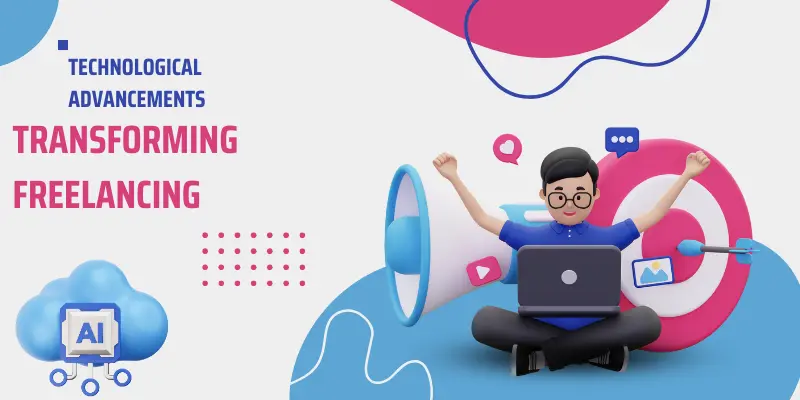
- Creative Fields (Design, Writing, etc.):
- In creative industries like graphic design and content writing, AI tools can assist in automating design layouts, grammar checking, SEO optimization, or even generating content ideas. For example, AI-powered platforms like Canva and Jasper AI can help freelancers save time on routine tasks while boosting creative output.
- Technical Fields (Development, Data Analysis, etc.):
- Freelancers in technical fields can use AI for tasks like code completion, debugging, and data analysis. Tools such as GitHub Copilot assist developers by suggesting code, while AI-powered analytics tools like Tableau can help data analysts streamline complex data processing.
- Service Fields (Consulting, Virtual Assistance, etc.):
- In fields like virtual assistance or consulting, AI tools can manage scheduling, automate repetitive administrative tasks, or perform research, allowing freelancers to dedicate more time to client relationships and strategy development.
- Ethical AI Usage: Building Responsible Practices Into Your Workflow:
- As AI becomes more integrated into freelancing, it’s important to consider ethical usage. Freelancers should ensure that AI tools are being used responsibly, particularly when handling data privacy, bias in algorithms, and ensuring AI does not perpetuate harmful stereotypes. Establishing ethical standards helps build trust with clients and keeps the freelance industry responsible and transparent.
- Practical Framework: Identifying Which Tasks to Automate vs. Which to Keep Human-Centered:
- Freelancers should adopt a strategic approach to incorporating AI into their workflows. Here’s a simple framework:
- Automate: Routine, repetitive tasks such as data entry, basic content editing, scheduling, or customer service inquiries.
- Keep Human-Centered: Tasks that require creativity, critical thinking, emotional intelligence, or personal interaction such as client communication, customized solutions, or creative direction.
- Freelancers should adopt a strategic approach to incorporating AI into their workflows. Here’s a simple framework:
Example: How AI and Freelancers Are Thriving Together
Sarah, a freelance graphic designer, uses AI-based tools like Canva for quick mock-ups and Adobe Sensei for smart editing. This allows her to focus on client feedback, creative concepts, and unique designs. Sarah’s use of AI has not only made her more productive but has also helped her expand her client base by offering faster turnaround times while maintaining high-quality work.
By integrating AI into their workflows, freelancers are not only increasing productivity but also enhancing their creative capabilities and providing higher-value services to clients. The partnership between AI and human freelancers is a powerful tool for growth in the rapidly evolving freelance economy.
Building Financial Resilience: Thriving in the 2025 Freelance Economy
The freelance economy is evolving rapidly, and freelancers need to adapt to new economic realities to maintain financial resilience. Here’s how freelancers can thrive in 2025’s shifting landscape:
New Economic Realities: Inflation, Global Market Access, and Rate Pressures
Freelancers must navigate rising inflation and global competition while adjusting their pricing strategies to remain competitive and ensure fair compensation in a shifting economic landscape.
- As inflation continues to impact global markets, freelancers will face increased living costs, making it crucial to adjust pricing and income strategies. With global market access, freelancers now have the ability to reach clients worldwide, but they must balance rate pressures to stay competitive while ensuring fair compensation for their skills and expertise.
Diversifying Your Income: Building Multiple Revenue Streams for Stability
Freelancers can secure financial stability by diversifying their income sources through service expansion, product offerings, and passive income opportunities.
- Service Diversification Strategies: Freelancers can secure their financial future by diversifying their services. For example, a web developer could also offer UX consulting, or a writer could expand into content strategy or SEO services. Diversification reduces reliance on one income stream and offers stability in uncertain markets.
- Product-Service Hybrid Models: Combining services with products can enhance a freelancer’s earning potential. For instance, a graphic designer can offer digital templates or an online course to teach design skills, creating a steady income stream beyond client work.
- Passive Income Opportunities: Freelancers can generate passive income by creating and selling online courses, ebooks, or stock photography. These opportunities offer recurring revenue and help build a portfolio of income-generating assets over time.
Smart Tax Strategies: Navigating Global Tax Challenges for Freelancers
Global freelancers must navigate complex tax regulations and utilize strategic tools to minimize liabilities and maximize financial efficiency across borders.
- Freelancers working across borders need to understand tax laws in different countries. Utilizing tools like accounting software or consulting with a tax professional who specializes in international tax can help minimize liabilities. Strategies like claiming business expenses, setting up retirement savings accounts, or exploring tax treaties can increase financial efficiency.
Securing Your Future: Investment and Retirement Planning for Freelancers
To secure their future, freelancers should adopt proactive investment and retirement strategies, building diversified portfolios that accommodate the unpredictability of freelance income.
- Freelancers should prioritize long-term financial planning, even with the unpredictability of income. Contributing to a retirement fund, such as an IRA or 401(k) (if available), can help ensure financial security in the future. Investing in stocks, mutual funds, or real estate can provide additional income streams, but freelancers should consult with a financial advisor to make informed decisions.
Streamlining Your Finances: How Financial Tech Tools Are Transforming Freelance Money Management
Financial technology tools are revolutionizing how freelancers manage their finances, offering seamless solutions for invoicing, expense tracking, and tax preparation to streamline operations.
- The rise of financial technology tools is transforming how freelancers manage their finances. Apps like QuickBooks Self-Employed, FreshBooks, and Wave allow freelancers to easily track expenses, invoices, and tax deductions. These tools streamline financial management and help keep freelancers organized.
- Pricing Strategies for 2025: Value-Based Approaches for Premium Positioning:
- As the market evolves, freelancers must adopt value-based pricing strategies, where clients pay for the value you bring rather than the hours worked. Freelancers who position themselves as specialized experts in a niche field can justify premium rates. Offering package deals or retainers rather than hourly billing can provide steady, predictable income.
By adapting to new economic conditions and strategically diversifying income, freelancers can protect their financial health and prepare for long-term success in the changing economy. These strategies will help them stay resilient, whether they’re working with local clients or global opportunities.
Future-Ready Freelancers: Embracing Emerging Business Models for Long-Term Success
Freelancers are no longer limited to traditional hourly gigs. New, innovative business models are emerging, allowing freelancers to scale their businesses and position themselves for long-term success. Here are some of the most exciting trends:
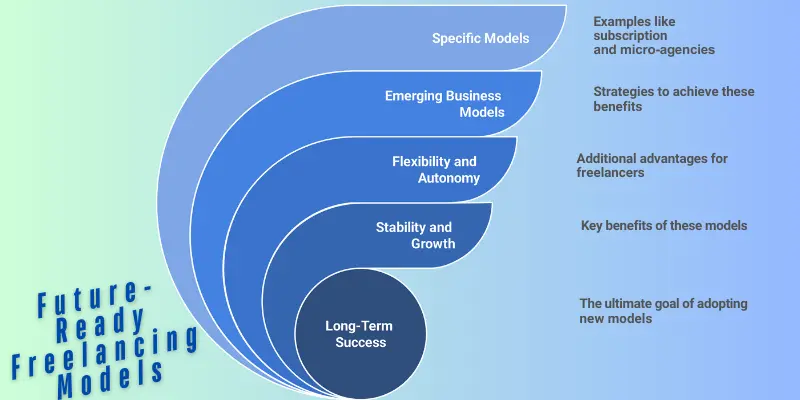
Moving Beyond Gigs: Unlocking the Power of Subscription-Based Freelancing
Subscription-based freelancing transforms traditional models by offering freelancers recurring revenue through ongoing services, creating stable income and lasting client relationships.
- Subscription-based freelancing offers recurring revenue instead of one-time project payments. Freelancers can offer ongoing services, such as monthly content creation, website maintenance, or consulting packages. This model provides predictable income and strengthens client relationships by delivering consistent value over time.
Example: A digital marketer could create a monthly content package, offering clients a set number of blog posts or social media updates each month for a fixed fee.
Micro-Agencies: Collaborative Models for Scalable Freelance Success
Micro-agencies enable freelancers to collaborate efficiently on large projects, combining their specialized skills while avoiding the overhead costs of traditional agencies.
- Micro-agencies involve a small group of freelancers collaborating on projects without the overhead costs associated with traditional agencies. By pooling resources and expertise, micro-agencies can take on larger projects while keeping costs low. Freelancers can specialize in different aspects of a project, allowing them to provide full-service offerings to clients.
Example: A copywriter, graphic designer, and web developer could team up to offer end-to-end marketing campaigns for clients, leveraging each freelancer’s strength while avoiding agency expenses.
Productized Services: Turning Expertise into Scalable, Profitable Packages
Productized services allow freelancers to streamline their offerings into fixed packages, enabling them to scale efficiently and serve multiple clients with consistent, predictable deliverables.
- Productized services involve turning a freelancer’s expertise into a standardized, packaged offering that can be sold to multiple clients. This business model allows freelancers to scale their operations by offering clear deliverables at set prices.
- Example: A photographer could offer a fixed-price package for a set number of photos for events, eliminating the need to negotiate prices on a per-project basis.
Specialized Collectives: Collaborating for Comprehensive, High-Impact Solutions
Specialized collectives enable freelancers to combine their unique expertise, delivering holistic services that attract a diverse client base while maintaining flexibility and collaboration.
- Freelancers are forming specialized collectives by collaborating with others who offer complementary skills. This allows freelancers to offer more comprehensive services and access a wider range of clients without having to manage a full team.
Example: A content strategist could partner with a graphic designer and SEO expert to offer an all-in-one content creation and optimization package to clients.
Breaking Free from Platforms: Building Direct Client Acquisition Channels
Building direct client acquisition channels allows freelancers to reduce dependency on third-party platforms, increasing control over their business and boosting profitability.
- Freelancers are moving away from reliance on platforms like Upwork and Fiverr by building their own client acquisition channels. This includes establishing personal websites, email lists, and social media presence to attract clients directly, reducing fees and increasing profit margins.
- Example: A freelance writer might use their personal blog and social media profiles to showcase their expertise, attract clients, and offer services directly, bypassing middlemen.
Case Studies: Business Models That Are Already Delivering Freelance Success
- Case Study 1: A graphic designer created a subscription model, offering clients a monthly design package at a fixed rate. This model led to recurring revenue and allowed the designer to focus on a smaller set of loyal clients.
- Case Study 2: A group of freelancers formed a micro-agency to handle a large marketing project, dividing the work between specialists in SEO, copywriting, and design. The collaboration resulted in high-quality work, satisfied clients, and reduced operational costs.
By adopting these emerging business models, freelancers can move beyond the gig economy and build sustainable, scalable businesses that offer more stability and growth opportunities in the coming years. These models not only create new income streams but also provide greater flexibility and autonomy.
Building Your 2025 Freelance Tech Stack: Essential Tools for Success
As freelancers look toward 2025, having the right technology stack will be crucial for staying competitive and efficient. Here’s a breakdown of the tools and technologies freelancers will need to thrive:
Evolving Productivity Tools: Streamlining Freelance Workflows for 2025
The evolution of core productivity tools will empower freelancers to automate routine tasks, streamline project management, and enhance overall workflow efficiency using AI-driven all-in-one platforms.
- Freelancers will rely on all-in-one platforms like Trello, Asana, and QuickBooks to manage projects, track time, and handle invoicing. These tools are continuously evolving, offering AI-powered features to automate routine tasks and improve workflow management.
- New tools will help freelancers manage financials, deadlines, and team collaborations from a single platform, streamlining day-to-day operations and increasing productivity.
Future-Ready Communication Platforms: Enhancing Remote Collaboration in 2025
By 2025, communication and collaboration platforms will evolve to offer advanced features, enabling freelancers to seamlessly manage tasks, share files, and enhance client and team collaboration.
- Slack, Zoom, and Microsoft Teams will remain essential for communication, but by 2025, these platforms will integrate more advanced features for real-time collaboration, task management, and file sharing.
- Freelancers will use these tools not just for meetings but for collaborative project spaces, allowing for better client interactions and streamlined team workflows.
Specialized Tools for Every Freelancer: Boosting Efficiency by Industry
Specialized tools tailored to each freelance category will enhance productivity and streamline workflows, enabling creatives, developers, and consultants to deliver higher-quality results with greater efficiency.
- Creative Freelancers: Tools like Adobe Creative Cloud, Figma, and Procreate will remain key for design and multimedia work. Freelancers can expect more integrations for AI-assisted creativity to enhance design speed and accuracy.
- Technical Freelancers: Developers and data analysts will rely on tools like GitHub, Jupyter Notebooks, and JetBrains for code management and data analysis. New AI tools will assist in bug fixing and data cleaning, reducing time spent on repetitive tasks.
- Consultants and Virtual Assistants: Freelancers offering consulting and admin services will rely on tools like Notion, Zapier, and Calendly to automate scheduling, client management, and admin tasks, improving efficiency.
Safeguarding Your Freelance Business: Essential Security and Privacy Tools
With the rise of cybersecurity risks, freelancers will rely on essential tools to safeguard sensitive data, ensure privacy, and build trust with clients in an increasingly digital world.
- As cybersecurity concerns grow, freelancers will use tools like 1Password for password management, NordVPN for secure internet connections, and Signal for encrypted messaging.
- These tools ensure client confidentiality, data security, and privacy while working remotely, which is crucial in building trust and maintaining professionalism.
Emerging Technologies Shaping Freelance Work: What You Need to Know for 2025
The rise of blockchain, virtual reality, and data analytics will empower freelancers to deliver secure contracts, immersive services, and data-driven insights, transforming their work processes.
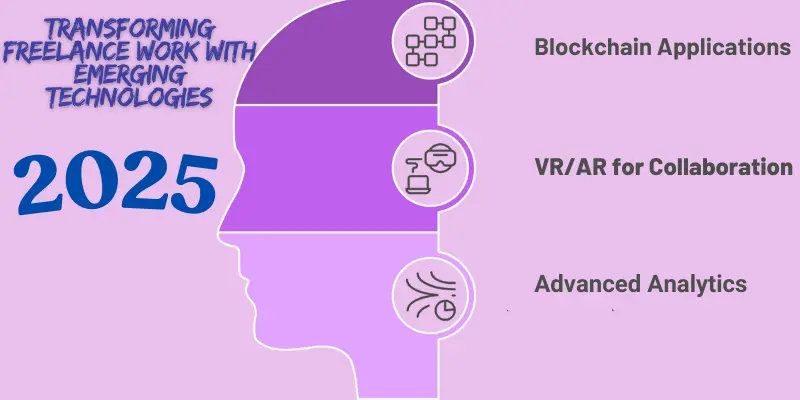
- Blockchain Applications for Contracts and Payments: Blockchain will enable secure, transparent contracts through smart contracts. Freelancers will be able to get paid directly via cryptocurrency with minimized fees and quicker payments.
- VR/AR for Remote Collaboration and Service Delivery: Virtual Reality (VR) and Augmented Reality (AR) will revolutionize how freelancers collaborate with clients. Whether for virtual design reviews or immersive remote consultations, these technologies will make collaboration more interactive and effective.
- Advanced Analytics for Business Intelligence: Freelancers will use data analytics tools like Google Analytics and Tableau to better understand client needs, optimize their services, and track business performance. These tools will provide insights to help freelancers make data-driven decisions for growth.
Step-by-Step Guide: How to Adopt the Right Technology for Freelance Success
A strategic approach to adopting new technologies involves assessing business needs, selecting the right tools, and continuously evaluating their impact to ensure ongoing growth and competitiveness.
- Step 1: Evaluate Needs: Determine which areas of your business would benefit most from new tech (e.g., automating workflows, improving client communication, or enhancing service delivery).
- Step 2: Research Tools: Explore the latest tools in your freelance category and choose the ones that align with your needs and budget. Look for integration capabilities and user-friendly interfaces.
- Step 3: Start Small: Begin with one or two tools to test their effectiveness. Gradually expand your tech stack as you become more comfortable with new technologies.
- Step 4: Measure Impact: Regularly assess the impact of these tools on your business. Use analytics to track improvements in productivity, client satisfaction, and revenue generation.
- Step 5: Stay Updated: Keep an eye on emerging technologies and tools. Stay informed about updates and new releases to ensure your business remains competitive.
By adopting the right technology stack, freelancers can increase efficiency, boost productivity, and stay ahead in the competitive world of remote freelancing. These tools will allow them to scale their businesses, enhance client relationships, and continue thriving in 2025 and beyond.
Fostering Well Being and Connection: The Human Side of Remote Freelancing in 2025
As remote work continues to evolve, freelancers need to focus on wellbeing and community to thrive in an increasingly isolated and technology-driven environment. Here’s how freelancers can maintain a healthy and balanced work-life dynamic in 2025:
Prioritizing Mental Health: Strategies to Thrive in 2025’s Remote Work Landscape
As remote work blurs the lines between personal and professional life, freelancers must prioritize mental health with strategies like mindfulness, digital detoxes, and accessible therapy apps.
- The shift to remote work can blur the boundaries between work and personal life, leading to stress and burnout. Freelancers should practice mindfulness and meditation techniques to stay grounded. Regular digital detoxes are essential, as constant screen time can negatively impact mental health.
- Therapy apps like BetterHelp or Talkspace provide easy access to mental health support, helping freelancers manage stress, anxiety, or loneliness while working remotely.
Creating Strong Connections: Building a Thriving Community in a Remote World
In an increasingly remote world, freelancers must actively build and nurture communities through online networks, virtual events, and co-working spaces to foster collaboration and combat isolation.

- As freelancing becomes more independent, freelancers need to create and nurture strong communities for support and networking. Joining freelancer groups, attending virtual events, or participating in online forums helps build connections with others in the same industry or niche.
- Co-working spaces (physical and virtual) will continue to thrive as places where freelancers can share ideas, collaborate, and fight isolation. Platforms like WeWork or Spaces can also provide temporary office spaces that encourage community building.
Beyond Balance: Mastering Work-Life Integration for Long-Term Success
Freelancers will adopt work-life integration by blending personal and professional commitments, allowing for greater flexibility, balance, and sustained productivity.
- Instead of focusing solely on achieving a work-life balance, freelancers in 2025 will embrace work-life integration. This approach allows for flexibility, where personal and work commitments blend naturally rather than being compartmentalized.
- Scheduling flexible hours, taking frequent breaks, and setting clear boundaries for work time and personal time will allow freelancers to stay energized and productive without feeling overwhelmed.
Staying Healthy While Working Remote: Physical Wellness for Digital Freelancers
- Remote work often means long hours at a desk, which can lead to physical health issues like back pain, eye strain, and poor posture. Freelancers should incorporate regular exercise into their daily routine, such as stretching exercises or short walks to counteract the effects of prolonged sitting.
- Ergonomic furniture like standing desks and supportive chairs, as well as blue light glasses, can help reduce strain on the body and eyes, improving comfort during work hours.
Combating Isolation: New Models of Co-Working and Collaboration
To combat isolation, freelancers are embracing virtual co-working tools and hybrid spaces that foster collaboration, accountability, and a strong sense of community.
- The physical isolation of remote work can be challenging. New models of virtual co-working allow freelancers to collaborate and socialize with others while working remotely. Tools like Sococo and Focusmate facilitate virtual co-working sessions, providing a sense of accountability and community connection.
- In-person co-working spaces and hybrid models that offer both virtual and physical locations will remain essential for freelancers to combat isolation and feel part of a broader network.
Boosting Productivity Sustainably: Thriving in an AI-Powered Freelance World
In an AI-driven world, freelancers must balance automation with mindful work practices, ensuring high productivity while prioritizing mental and physical well-being.
- With the growing use of AI tools, freelancers should find sustainable productivity practices that prevent burnout while maximizing output. This means using AI to automate repetitive tasks and optimize workflows, freeing up time for more meaningful, human-centered work.
- Setting boundaries for work hours and embracing deep work periods where focus is undisturbed will help ensure quality over quantity. By combining AI tools with strong mental and physical wellbeing strategies, freelancers can achieve high productivity without sacrificing their health.
By focusing on wellbeing, community, and sustainable practices, freelancers can build long-term success and stay mentally and physically healthy in the fast-paced, remote world of 2025.
Unlocking Global Freelance Opportunities and Overcoming 2025 Challenges
Freelancers in 2025 have a unique opportunity to expand their reach beyond borders, but with these opportunities come challenges. Here’s how freelancers can navigate the global freelance landscape:
Mastering Cross-Border Payments: Secure and Cost-Effective Solutions for Freelancers
To manage international transactions efficiently, freelancers should explore a variety of cross-border payment platforms, ensuring quick, secure, and cost-effective payments.
- Freelancers working with international clients need to be aware of cross-border payment systems to ensure smooth transactions. Platforms like PayPal, TransferWise (now Wise), and Payoneer offer low-fee international transfers, making it easier to manage payments across currencies.
- Cryptocurrency is also gaining popularity, providing an alternative payment option that bypasses traditional banking systems and helps reduce transfer costs.
Developing Cultural Intelligence: Building Stronger Global Client Relationships
Freelancers can build stronger global relationships by developing cultural intelligence, adapting their communication and work styles to meet the expectations of clients from diverse backgrounds.
- Freelancers must understand cultural differences to build strong, professional relationships with clients from diverse backgrounds. Being aware of local business customs, communication styles, and workplace expectations will help create positive interactions and avoid misunderstandings.
- For example, in some countries, clients may prefer formal communication and structured contracts, while others might appreciate a more flexible and casual approach. Developing cultural intelligence will give freelancers a competitive edge in global markets.
Staying Ahead of Global Regulations: Freelance Laws and Compliance in 2025
Freelancers must stay informed about evolving global legislation that impacts freelance rights, taxation, and social security to ensure compliance and protect their interests.
- Freelancers need to stay updated on freelance-specific legislation in different countries. Many nations are beginning to implement laws that address issues like taxation, freelance rights, and social security benefits for independent workers.
- For example, the European Union is working on a freelance-specific legal framework, which will affect contractual rights, while California’s AB5 law has changed how freelancers in certain industries are classified.
Exploring Digital Nomad Visas: Expanding Your Freelance Career Abroad
The growing availability of digital nomad visas offers freelancers the opportunity to live and work abroad with added benefits like tax exemptions and extended stays, enhancing their global mobility.
- The rise of digital nomadism is leading to an increase in nomad visa programs, which allow freelancers to live and work legally in foreign countries. Countries like Estonia, Portugal, and Barbados have launched digital nomad visas, making it easier for freelancers to work remotely while enjoying a new environment.
- These visas often come with benefits like tax exemptions, healthcare access, and the ability to stay in a country for extended periods without worrying about work permits.
Sustainable Remote Work: Reducing Environmental Impact and Embracing Eco-Friendly Practices
Freelancers can embrace sustainable remote work practices by using eco-friendly tools, reducing travel, and optimizing energy consumption to minimize their environmental impact.
- As the world focuses on sustainability, freelancers can adopt eco-friendly practices to minimize their environmental impact. Sustainable digital tools, remote collaboration, and energy-efficient work setups are all ways freelancers can reduce their carbon footprint.
- Freelancers should also be mindful of the carbon impact of their travel. Opting for virtual conferences instead of flying for events can help reduce emissions.
Capitalizing on Regional Demand: Skills and Opportunities Growing Across the Globe
By analyzing regional market trends, freelancers can target high-demand skills in specific areas, positioning themselves to capture growing opportunities and expand their client base.
- Understanding regional demand for specific skills is crucial for freelancers looking to expand their client base. For example:
- In Asia, demand for IT professionals and software developers is growing rapidly.
- In Europe, content marketing and SEO services are in high demand as businesses seek to improve their online presence.
- In Latin America, graphic design and video production are seeing significant growth due to increasing digital media consumption.
- Freelancers who specialize in in-demand skills in these regions will have a competitive advantage in securing new clients.
By embracing these global opportunities and overcoming the challenges that come with them, freelancers can expand their reach, diversify their client base, and thrive in a dynamic, interconnected world. The key lies in adapting to new regulations, understanding cultural nuances, and staying aware of emerging trends.
Future-Proofing Your Freelance Career: Essential Skills to Learn for 2025 Success
As the freelance landscape evolves in 2025, staying competitive means constantly evolving your skill set. Here’s how freelancers can future-proof their careers by focusing on the right skills:
Timeless Skills for Freelancers: What Will Remain Valuable Amid Automation
Freelancers should focus on timeless skills like creativity, critical thinking, and relationship management, which are irreplaceable by AI and automation.
- Creativity: Skills like design, writing, and art direction will always require a human touch, even as AI assists in these fields.
- Critical Thinking: The ability to analyze complex situations and develop unique solutions will remain a highly sought-after skill, as AI can’t replace human judgment in nuanced decision-making.
- Client Relationship Management: Building strong, trust-based relationships with clients will continue to be essential, as freelancers maintain their role as problem-solvers and consultants.
In-Demand Skills for 2025: Emerging Areas to Specialize In
As industries evolve, AI, cybersecurity, and UX/UI design are poised to see the highest demand, offering new opportunities for freelancers to specialize in these growing fields.

- AI and Machine Learning: Freelancers in tech will need to understand how AI works and how to apply it to various industries, whether for data analysis, automation, or software development.
- Cybersecurity: With more businesses relying on digital operations, the need for freelance cybersecurity experts will grow rapidly to protect data and systems.
- UX/UI Design: As digital experiences become more sophisticated, user experience (UX) and user interface (UI) design will remain in high demand.
Mastering Soft Skills: Key Competencies Freelancers Must Excel In
In an increasingly digital world, advanced communication, cross-cultural collaboration, and complex problem-solving will be essential for freelancers to build strong client relationships and stay competitive.
- Advanced Communication in Digital Environments: Effective communication will remain key in a remote-first world. Freelancers need to master clear, concise written communication and virtual presentations to engage clients and teams.
- Cross-Cultural Collaboration: Working with clients and teams from different cultures is increasingly common. Freelancers must develop the ability to communicate effectively across time zones, languages, and business practices.
- Complex Problem-Solving: As industries become more complex, the ability to break down and solve intricate problems will be highly valued. Freelancers who can offer innovative solutions will stand out in the marketplace.
Lifelong Learning: How Freelancers Can Stay Adaptable in a Changing Market
Freelancers must embrace lifelong learning and stay adaptable to new technologies and trends, ensuring they remain competitive and resilient in an ever-changing market.
- The freelancing world is changing fast, so being able to adapt to new technologies, work processes, and client needs is crucial. Freelancers will need to embrace lifelong learning to stay relevant.
- Upgrading skills in line with technological advancements or new industry demands will ensure that freelancers remain competitive and are equipped for new opportunities.
- Practical Upskilling Roadmap by Freelance Category:
- Creative Freelancers: Focus on advanced design software, digital marketing, or motion graphics to enhance your value.
- Technical Freelancers: Learn the latest in AI development, cloud computing, or data visualization tools.
- Consulting Freelancers: Build expertise in leadership, project management tools, and data-driven decision-making to stay relevant in a shifting landscape.
- Learning Resources and Platforms Evaluation:
- Freelancers can take advantage of online platforms like Coursera, Udemy, and LinkedIn Learning to access a wide range of courses. These platforms provide both specialized skills (like machine learning or graphic design) and soft skills (like effective communication and cross-cultural collaboration).
- Bootcamps and workshops offer intensive, hands-on learning experiences that can fast-track skill development, while industry certifications can help freelancers establish credibility in specialized fields.
By focusing on these evergreen skills and emerging trends, freelancers can position themselves for long-term success in the 2025 freelance economy. It’s essential to stay on top of new technologies and shifting client needs, while continuing to improve soft skills and adapt to the evolving remote work environment.
Preparing for 2025: A Strategic Framework for Freelance Success
To succeed in the evolving freelance landscape of 2025, freelancers need a clear plan for growth and adaptation. Here’s a framework to guide you in preparing for the future:
Self-Assessment for Success: Evaluating Your Readiness for 2025
Evaluate your current skill set, client base, and business strategies to identify growth opportunities and prepare for the evolving demands of the 2025 freelance market.
- Begin by evaluating your current skills, client base, and workflows to identify areas for improvement. Ask yourself:
- Are your skills up to date with industry trends?
- Do you have a stable client base, or are you dependent on one or two clients?
- Are your pricing strategies competitive in 2025’s market?
- Use this self-assessment to highlight areas of growth and start forming a plan to fill those gaps.
18-Month Roadmap: Milestones to Achieve Freelance Success in 2025
Break down your preparation into achievable goals over the next 18 months, focusing on skill development, business diversification, and client retention to ensure long-term success.
- Months 1-6: Focus on upskilling and acquiring new technologies or services. Set milestones like completing a course on AI tools or getting certified in a high-demand freelance area.
- Months 7-12: Start diversifying your income streams (e.g., adding productized services or a subscription model). Also, begin building your personal brand and expanding your network.
- Months 13-18: Implement advanced marketing strategies, assess your financial stability, and make adjustments to your business model. Focus on client retention strategies and build long-term contracts or retainers.
Custom Action Plans: Tailoring Strategies for Established Freelancers, Newcomers, and Career Shifters
Create personalized action plans for established freelancers, transitioning employees, and newcomers to help each group meet their unique challenges and goals in the 2025 freelance economy.

- Established Freelancers Pivoting for Future Readiness:
- Focus on evolving your services to meet 2025 demands. Consider integrating AI tools into your workflow or exploring specialized niches to set yourself apart.
- Expand your network by reaching out to clients in emerging markets or new industries. Set up a personal website to increase direct client acquisition.
- Traditional Employees Transitioning to Freelancing:
- Start small by transitioning part-time, building a client base while still working in your traditional job.
- Build financial stability by saving a financial cushion for the transition period and investing in tools that will help you run your freelance business effectively.
- New Entrants to the Freelance Market:
- Focus on building a strong portfolio in your area of expertise. Use platforms like Upwork or Fiverr to gain initial experience, but aim to transition to direct clients over time.
- Invest in learning resources and networking events to connect with industry professionals and start building relationships.
- Risk Assessment and Mitigation Strategies:
- Identify potential risks to your freelance business (e.g., loss of clients, economic downturns, automation threats).
- Mitigation Strategies:
- Diversify your income streams to reduce reliance on one client or service.
- Regularly assess and adjust pricing to stay competitive.
- Keep learning and adapting to new technologies to avoid becoming obsolete in your field.
- Opportunity Identification Methodology:
- Constantly evaluate where opportunities are emerging in the freelancing world. For example, look for areas where AI is transforming industries and consider how you can apply your skills in those areas.
- Use market trends, client feedback, and networking to stay informed about upcoming niches and new demand for specialized services. Aim to anticipate changes and adapt before they fully take hold in the industry.
By following this preparation framework, freelancers can take actionable steps toward future success and ensure they are well-prepared for the changes in the 2025 freelance economy. Whether you’re an established freelancer, a traditional employee, or a newcomer, this framework will help you build a strong, adaptable freelance business.
How Client Acquisition and Relationship Strategies Will Evolve in 2025
As freelancing continues to grow, client acquisition and relationship management strategies must evolve to meet the demands of the 2025 market. Here’s how freelancers can adapt:
How Client Expectations Will Evolve in 2025: What Freelancers Need to Know
Clients will demand more specialized, timely, and high-quality work, with a stronger focus on flexibility and proactive communication in a global, remote environment.
- Clients will expect faster turnaround times, higher-quality work, and more personalized services. They will increasingly look for specialized expertise rather than generalists.
- There will be a stronger emphasis on proactive communication, with clients seeking regular updates and flexible work arrangements that cater to global teams and remote collaboration.
Building a Strong, Authentic Personal Brand for Freelance Success
A personal brand built on authenticity and expertise will be crucial, with freelancers leveraging content creation and social media to showcase their unique value and attract ideal clients.
- A strong personal brand is essential for standing out in a crowded market. Freelancers should showcase their unique strengths and expertise on personal websites, LinkedIn, and social media platforms.
- Consistently publishing thought leadership content, such as blogs, articles, or videos, can help establish credibility and attract ideal clients. Authenticity will be key, as clients increasingly value freelancers who demonstrate their true personality and values.
How to Evolve Your Portfolio for Maximum Impact
Freelancers must continuously update their portfolios to reflect recent work and results, ensuring it demonstrates their growth, expertise, and ability to drive client success.
- Freelancers need to continuously update their portfolios with recent, high-quality work that demonstrates their evolving skill set. It should showcase successful projects, client testimonials, and specific results (e.g., increased website traffic, enhanced branding).
- An effective portfolio goes beyond just showcasing work—it should tell a story of impact. Add case studies that highlight how your services solve problems or drive success for clients.
Effective Long-Term Client Relationship Strategies for Freelancers
Freelancers should focus on fostering strong, lasting client relationships by staying engaged, offering loyalty incentives, and consistently providing value beyond initial projects.
- Nurturing relationships with existing clients is just as important as acquiring new ones. Freelancers should implement follow-up systems to stay in touch with clients even after a project is completed.
- Offering loyalty programs, regular check-ins, or sharing relevant industry insights can keep clients engaged and open doors for repeat business or referrals.
How to Demonstrate Your Value in a Competitive Freelance Market
In a competitive market, freelancers must emphasize the tangible benefits and unique solutions they provide, moving away from competing solely on price.
- With competition growing, freelancers must clearly demonstrate the value they provide. Instead of simply competing on price, emphasize the quality, efficiency, and specific benefits your service offers.
- Use real-world examples, case studies, and measurable results to show potential clients how your work will solve their problems or boost their business outcomes.
Leveraging Testimonials and Social Proof to Build Trust
Utilizing authentic testimonials and client success stories on personal platforms helps build trust, credibility, and attract future business opportunities.
- Positive testimonials and client reviews are powerful tools for attracting new business. Freelancers should actively request testimonials after successful projects and showcase them prominently on their website and social profiles.
- Social proof—such as endorsements from industry influencers or sharing client success stories—helps build trust and credibility, making potential clients more likely to hire you.
Tailored Strategies for Enterprise vs. Small Business Freelance Clients
Freelancers must adapt their approach to cater to the needs of large enterprises by offering scalable services and streamlined processes, while providing personalized, flexible solutions for small businesses.
- Enterprise clients: These clients expect a more formal approach, with clear processes, project management tools, and a higher level of professionalism. Freelancers targeting enterprises should offer scalable services and streamlined communication for larger teams.
- Small business clients: Small businesses often value personalized attention and flexibility. Freelancers should focus on offering tailored solutions and building strong, long-term relationships. They can also offer affordable packages or customized plans that suit smaller budgets.
By evolving their client acquisition and relationship management strategies, freelancers can adapt to client expectations in 2025 and thrive in a highly competitive market. Building a personal brand, demonstrating value, and nurturing long-term relationships will be essential for sustained success.
Ready for 2025? Your Freelance Roadmap to Success Starts Here
The future of remote freelancing in 2025 is full of incredible opportunities, and with the right preparation, you can thrive in this evolving landscape. As we’ve seen, the key to success will be embracing AI collaboration, staying adaptable in the face of economic shifts, and positioning yourself strategically in the global freelance economy.
Here’s a quick recap of the top strategies to ensure your success in 2025:
- AI-human partnerships will redefine your workflow, increasing your productivity while maintaining your creative edge.
- Financial resilience is a must—diversify your income streams, optimize your taxes, and secure your retirement despite the fluctuations of freelance life.
- Embrace emerging business models like micro-agencies, subscription freelancing, and productized services to scale your business.
- Building a personal brand, nurturing client relationships, and staying mentally resilient will help you stay competitive in an increasingly crowded marketplace.
The future of freelancing is in your hands, and now is the time to start preparing. Evaluate where you stand today and identify the small changes you can make to set yourself up for success in 2025.
Next Steps for Success:
- Assess your skills and determine which ones need to evolve to keep up with 2025’s freelancing trends.
- Explore new technologies like AI tools and productivity platforms to streamline your workflow.
- Start building your personal brand today—ensure your portfolio reflects the value you bring to clients.
- Diversify your income—consider creating passive income streams, such as online courses or digital products, that align with your expertise.
Ready to take the leap into 2025?. Don’t wait—start building your future now, and stay ahead of the competition.
Everything You Need to Know About the Future of Freelancing in 2025
In 2025, freelancers should focus on AI integration, data analysis, advanced digital marketing, and project management. These skills will be in high demand as businesses seek freelancers who can collaborate with AI to increase efficiency. Soft skills like communication, cross-cultural collaboration, and adaptability will also be key. Specializing in niche markets, such as Blockchain Development or Augmented Reality Design, can set you apart in a crowded market.
Freelancers working internationally should understand cross-border taxation. Use tax tools like QuickBooks or consult with an accountant familiar with freelancer-specific tax laws. Pay attention to tax treaties between countries to avoid double taxation. Keep detailed records of your income and expenses, and consider setting aside a percentage of each payment for taxes.
latforms like Upwork and Fiverr will continue to be popular, but new decentralized freelancing platforms like Braintrust and WeWorkRemotely will rise, offering more freedom and better payment options for freelancers. Additionally, blockchain-based platforms could reshape freelancing, providing more security and transparency for both freelancers and clients.
Building a strong personal brand in 2025 will require showcasing your unique value through an optimized online portfolio and active social media presence. Share your expertise by writing blogs, creating videos, or even offering free resources. Engaging with communities in your niche on platforms like LinkedIn or Twitter will help you grow a network and establish authority. Ensure your portfolio reflects your evolving skills to stay relevant.
In 2025, freelance compensation will likely shift towards value-based pricing rather than hourly rates. This means you’ll charge based on the impact you deliver to a client, not just the time you spend. Expect higher rates for specialized skills and more flexible payment structures, such as retainer agreements or project-based fees. Freelancers will also see an increase in subscription-based income and recurring revenue streams.
Managing mental health in freelancing will be crucial in 2025, as remote work can lead to feelings of isolation and burnout. Freelancers should set clear work-life boundaries, incorporate regular breaks, and prioritize physical health through exercise and meditation. Joining online freelancer communities or co-working spaces can help you stay connected. It’s also important to maintain a flexible schedule that allows for rest and rejuvenation.
As freelancing becomes more tech-driven, tools like AI-powered writing assistants (e.g., Jasper), project management tools (e.g., Trello, Asana), and cloud storage (e.g., Google Drive, Dropbox) will become even more critical. Communication tools like Slack and Zoom will continue to be essential for remote collaboration. Additionally, blockchain-based payment systems like Bitcoin or Ethereum will streamline cross-border transactions.
o adapt to the future freelance market, continuously upskill, stay updated with technology trends, and diversify your offerings. Moving towards niche specialties or offering consulting services will help you stand out. Building a strong personal brand and maintaining an online presence will increase your chances of attracting high-value clients. Freelancers who adopt new technologies and embrace AI tools will thrive.
Finding clients in 2025 can be done through online platforms like Upwork, Freelancer, or LinkedIn. To attract clients, network online, participate in relevant communities, and showcase your work on personal websites or social media. Having a strong portfolio and client testimonials will also make you more attractive to potential clients.
Setting freelance rates in 2025 will depend on your skill level, market demand, and niche. Start by researching what others in your field are charging. A good approach is to use value-based pricing, where you charge based on the impact your work has for the client, not just the time spent. Over time, as you build your reputation, you can increase your rates. Make sure to adjust for inflation and market changes.

- Be Respectful
- Stay Relevant
- Stay Positive
- True Feedback
- Encourage Discussion
- Avoid Spamming
- No Fake News
- Don't Copy-Paste
- No Personal Attacks

- Be Respectful
- Stay Relevant
- Stay Positive
- True Feedback
- Encourage Discussion
- Avoid Spamming
- No Fake News
- Don't Copy-Paste
- No Personal Attacks



